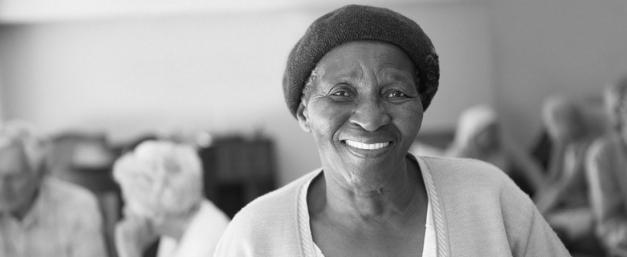
As the nation’s health system expands its focus on and commitment to improving care for the growing population of older adults, the National Collaboratory to Address Elder Mistreatment (NCAEM) recognizes that improving elder mistreatment identification, intervention, and prevention requires supporting people with a broad range of interests and careers. We are pleased to support this talent pipeline with the National Collaboratory to Address Elder Mistreatment Mentorship Program.
Our one-year program supports clinicians, service providers, researchers, policymakers, and advocates from multiple disciplines who are focusing on improving care for older adults experiencing or at risk of experiencing elder mistreatment. It is funded by The John A. Hartford Foundation, the Gordon and Betty Moore Foundation, and the Health Foundation for Western and Central New York.
Meet Our Previous Cohorts
Visit our Mentee/Mentor Directory to meet the 2023–2024 NCAEM Mentorship Program Cohort and their mentors or view our inaugural NCAEM Mentorship Program Cohort. In the following brief videos, two mentees in the first cohort reflect on how the NCAEM Mentorship Program is helping them pursue their interests and advance their goals.
Kenneth Steinman, PhD, MPH, Senior Research Scientist, The Ohio State University College of Education and Human Ecology: “As a mid-career researcher who has switched into the field of elder mistreatment, this has been a wonderful opportunity for me to be able to get to know some real leaders in the field and also to experience and hopefully contribute to a wonderful culture of collaboration that really attracted me to the field to begin with.”
Meredith Troutman-Jordan, PhD, RN, PMHCNS-BC, American Nurses Credentialing Center-Certified Psychiatric Mental Health Clinical Nurse Specialist: “My mentor is Dr. Bonnie Olsen, and I cannot say enough about how amazing she is. She has been instrumental in really helping me focus and further clarify and define my plans. I’d say she has really been the springboard that has helped pull everything together.”
Potential Applicants
Each year, we will select a varied cohort to participate in the mentorship program. Applicants representing or working with underserved populations are encouraged to apply. We welcome applications from a wide range of candidates, such as:
- A social worker aiming to design and implement a new protocol to support older adults experiencing elder mistreatment in the community
- A physician seeking to improve screening practices at their hospital and considering adopting the Elder Mistreatment Emergency Department Toolkit
- A gerontologist exploring the impact of loneliness, social isolation, and efforts to mitigate these factors on elder mistreatment
- A nurse hoping to strengthen the connection between her hospital and Adult Protective Services, the Area Agency on Aging, and other community-based agencies
- A social science researcher interested in exploring the impact of ageism in elder mistreatment among older adults of different races and ethnicities
- A mid-career researcher with notable achievements in other areas but wants to shift their focus to addressing elder mistreatment issues
- An emergency department nurse serving as a clinical champion for an intervention designed to improve identification and response for elder mistreatment
- A community organizer, prosecutor, or other professional interested in influencing policy by promoting advocacy and shaping legislation
Key Features and Benefits for Mentees
Mentees will:
- Be paired with an expert mentor sharing similar interests and experience in the field
- Meet at least once a month with their mentor, either virtually or in-person
- Design and complete a project of their choosing
- Participate in a fully funded, two-day convening in Washington, D.C., in February 2026 to present their project and engage with fellow mentees and experts
Mentorship can be integral to all aspects of career development, including:
- Designing and evaluating the effectiveness of new or revised initiatives
- Developing leadership skills and strategies for professional advancement
- Establishing connections with potential collaborators in the field
- Building social and professional capital through expanded networks
- Gaining access to existing and secondary data for research purposes
- Identifying relevant funding opportunities
- Acquiring grant writing skills to secure financial support
- Receiving guidance for career development and growth
Eligibility Requirements
We welcome applications from individuals across various disciplines, career stages, and backgrounds, including clinicians, service providers, researchers, policymakers, and advocates, for the 2025-2026 cohort. Those transitioning or interested in transitioning their focus to elder mistreatment are also welcome to apply. Currently, we are accepting applications from U.S.-based candidates only.
Selection Criteria
Applications are evaluated based on the following criteria:
- The candidate’s level of demonstrated interest in elder mistreatment
- The likelihood that the applicant will make a significant impact in the field of elder mistreatment
- The potential of the Mentorship Program to enhance or expedite the candidate’s career development
- The promise and potential impact of the proposed project
Application and Deadline
Please apply to the NCAEM Mentorship Program here. Applications are due by 11:59 PM PST on November 22, 2024.
Roybal Center Fellowship
Applicants may also be interested in reviewing information about the Roybal Center for Translational Research Fellows Program. If you are also interested in being considered for this program as well, please indicate this on your application form.
Inquiries
For any questions about the application process or the NCAEM Mentorship Program in general, please send an email to NCAEM@edc.org. Our team will be happy to provide assistance and information.